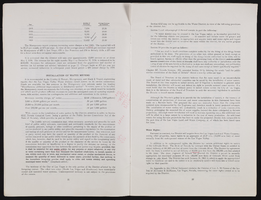Search the Special Collections and Archives Portal
Search Results

Wayne Tanaka oral history interview: transcript
Date
Archival Collection
Description
Oral history interview with Wayne Tanaka conducted by Ayrton Yamaguchi, Vanessa Concepcion, Kristel Peralta, Cecilia Winchell, and Stefani Evans on March 12, 2021 for Reflections: The Las Vegas Asian American and Pacific Islander Oral History Project. Wayne shares his family's heritage and history as Japanese Hawaiians and discusses his father's internment during World War II. He shares his background growing up in Lahaina, Maui, Hawai'i and how he came to live in Las Vegas. Wayne discusses his career as an educator for the Clark County School District and talks about his life in Las Vegas with his wife and daughters. Subjects discussed include: Las Vegas Buddhist Sangha; Executive Order 9066; Sunset High School; Boulder Dam Area Council.
Text
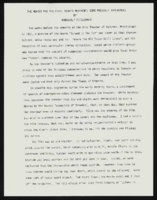
"The Movies and the Civil Rights Movement: Some Possible Influences": manuscript draft by Roosevelt Fitzgerald
Date
Archival Collection
Description
From the Roosevelt Fitzgerald Professional Papers (MS-01082) -- Unpublished manuscripts file.
Text

Transcript of interview with Ronald Simone by Claytee White, May 5, 2009
Date
Archival Collection
Description
Musician Ronald Simone of Las Vegas credits his father’s guidance and his upbringing in New Haven, Connecticut, for shaping his musical and educational aspirations. Due to its proximity to New York City and the influence of Yale University, New Haven offered its residents the finest in musical entertainment; as a result, many musical greats were from or had lived in New Haven and most Broadway shows opened at New Haven’s Shubert Theater. Born in 1935 with the gift of perfect pitch, Simone began to play the piano at a young age and could play most pieces by ear. He began playing professionally at age eight in 1943 with a weekly stint on a radio show, Kitty's Revue. Still in grade school during World War II he began touring locally with an amateur producer, who formed a show that played military bases and hospitals around Connecticut and into New York and Massachusetts. In high school Simone formed his own trio and a quartet and played piano in gin mills, illegal card rooms, and resorts in upstate New York while playing trumpet in the high school band. He joined the Musicians Union at 18 and continued to play in New York and Connecticut clubs and theaters throughout his five years at Yale. During his second year at Yale the School of Music became a graduate school, from which Ron graduated in 1958. Ron’s sister Louise married one of his Yale classmates, a drummer, and the couple moved to Las Vegas. Ron visited his sister in 1959, loved the musical opportunities he saw, transferred his Musicians Union membership, and moved to Las Vegas with his friend, violinist Joe Mack, in September 1960. After sub work and playing a lounge show at the Riviera, he spent five and a half years in the Riviera showroom, moving in 1966 to the Desert Inn, where he played piano in the exclusive Monte Carlo Room for five years for the likes of Dean Martin, Sandy Koufax, Sammy Davis Jr., and Kirk Kerkorian. From there Simone went to the Dunes, where he remained for the next nineteen years working with choreographer Ronnie Lewis and rehearsing and playing all the Casino de Paris shows, line numbers, and production numbers. In July 1989, Musicians Local 369 went on strike. Because Simone was playing the Follies Bergere at the Tropicana—the first house band to strike—he was among the first musicians to walk out. Musicians at all but three Strip hotels (Circus Circus, Riviera, and the Stardust) followed. While the musicians strike lasted nearly eight months, Simone was recruited for sanctioned sub work for the duration at the Lido de Paris show at the Stardust. After the strike ended he worked with Johnny Haig's relief band playing six nights a week at various hotels.
Text

Interview with Oliver Wilhelm Kaufmann, November 29, 2005
Date
Archival Collection
Description
Text
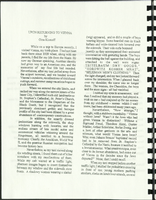
Compilation of writings from the Holocaust Survivors' Group, circa 1998
Date
Archival Collection
Description
Bound compilation of four issues of the Holocaust Survivors' Group essays and poems.
Text
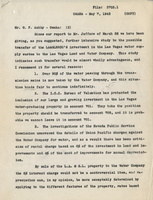
Letter from W. H. Hulsizer (Omaha) to G. F. Ashby (Omaha), May 7, 1942
Date
Archival Collection
Description
Hulsizer enumerated the many financial and political reasons that the water producing lands controlled by the Los Angeles & Salt Lake Railroad Company should be sold to the Las Vegas Land and Water Company.
Text
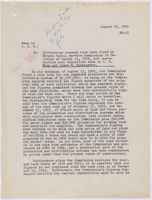
Memo from Edward C. Renwick to E. E. Bennett about the purchase price given to the Las Vegas Valley Water District, August 26, 1952
Date
Archival Collection
Description
Detailed discussion of why the purchase price set by the Nevada Public Service Commission for the purchase by the Las Vegas Valley Water District was too low.
Text
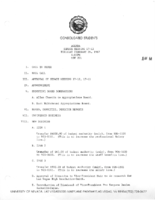
Meeting minutes for Consolidated Student Senate University of Nevada, Las Vegas, Febuary 26, 1987
Date
Archival Collection
Description
Text

